

“Social media users may experience higher levels of social dissatisfaction and unhappiness due to negative comparison between their and their friends’ happiness and popularity” (Bollen, 2017).
Addicted To Your Smartphone? It Might Not Be What You Think It Is. It is hard to peruse Facebook today and not do a few comparisons.

Yet according to research led by computer scientists at Indiana University, the conclusion that most of us arrive at when we log into services like Facebook, Twitter or Instagram is: everyone else looks like they’re having more fun. Randomly selecting 4.8 million Twitter users Johan Bollen, associate professor in the IU School of Informatics and Computing and his colleagues then analyzed the group for people who followed one another on the network, creating a social network of about 102,000 users with 2.3 million connections. The team then narrowed their focus to individuals with 15 or more “friends” on the network, which created a group of 39,110 Twitter users. They then analyzed the sentiment of these users’ tweets, a common method in computer science and marketing to assess whether digital postings are generally positive or negative in tone. Users with higher positive sentiment were defined as “happy.” What is Your Phone Doing to Your Relationships? Phubbing is the practice of snubbing others in favor of our mobile phones.
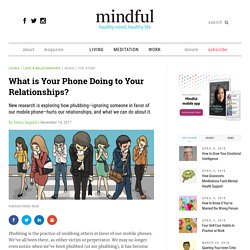
We’ve all been there, as either victim or perpetrator. We may no longer even notice when we’ve been phubbed (or are phubbing), it has become such a normal part of life. However, research studies are revealing the profound impact phubbing can have on our relationships and well-being. There’s an irony in phubbing. The Hidden Cost of Phone Addiction. Are Smartphones Making Us Stupid? Your iPhone Is Ruining Your Posture — and Your Mood. Photo THERE are plenty of reasons to put our cellphones down now and then, not least the fact that incessantly checking them takes us out of the present moment and disrupts family dinners around the globe.
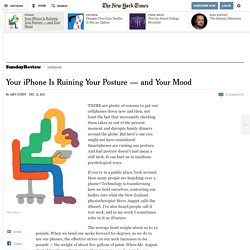
But here’s one you might not have considered: Smartphones are ruining our posture. And bad posture doesn’t just mean a stiff neck. It can hurt us in insidious psychological ways. If you’re in a public place, look around: How many people are hunching over a phone? The average head weighs about 10 to 12 pounds. When we’re sad, we slouch. Posture doesn’t just reflect our emotional states; it can also cause them. Slouching can also affect our memory: In a study published last year in Clinical Psychology and Psychotherapy of people with clinical depression, participants were randomly assigned to sit in either a slouched or an upright position and then presented with a list of positive and negative words. Distracted in 2016? Reboot Your Phone with Mindfulness. Estimated reading time: 11 minutes, 48 seconds This piece has also been cross-posted to Medium.
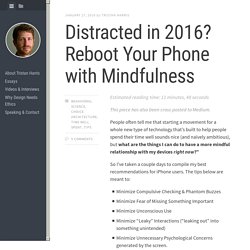
'Phubbing': The Modern Way To Kill Your Relationship. The cellphone behaviour linked to depression and lower relationship satisfaction.

Cellphones could be damaging romantic relationships and leading to depression, a new study finds. Researchers looked at the impact of snubbing your partner to look at your phone. They dubbed this ‘phubbing’ (phone snubbing). Dr James A. Roberts, the study’s first author, said: “What we discovered was that when someone perceived that their partner phubbed them, this created conflict and led to lower levels of reported relationship satisfaction.These lower levels of relationship satisfaction, in turn, led to lower levels of life satisfaction and, ultimately, higher levels of depression.”
Smart Phones, Stupid Choices and Alone Together. It’s one of the most pervasive issues in our culture today that’s off and on in the media, but no one talks about in their personal lives – our relationships with our phones.
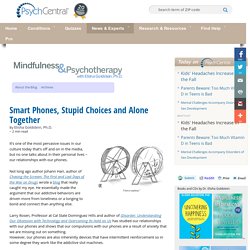
Not long ago author Johann Hari, author of Chasing the Scream: The First and Last Days of the War on Drugs wrote a blog that really caught my eye.
Social Media. Body Energy. Smartphones. 5 Ways to Organize Your Phone to Unhijack Your Mind. Your phone’s slick, minimalist shell betrays a cacophony of alerts from apps, notifications from non-humans, and icons your fingers barely intended to graze. Yet there you are, ten minutes later, not even using the toilet at that point. Tristan Harris, former design ethicist at Google and founder of Time Well Spent, offers these 5 tips for re-organizing your phone to create a less distracting experience: 1) Turn off notifications from machines. Could you turn off almost all notifications on your device? That way, when your device buzzes, you know it’s because a real human wants your attention, not a dating app. 2) Set up custom notifications for individuals. 3) Only put tools on your home screen. 4) Scramble your apps regularly. 5) Move all non-tool apps to a folder on your second screen.
Two Tips for Mindful Tech: How To Stop Checking Your Phone. How long do you think the average work email goes unread?

10 minutes? 5 minutes? 1 minute? Try 6 seconds. How to Stop Checking Your Phone Like an Addict. On December 16, 2013, a Taiwanese tourist was walking along St.

Kilda pier in Melbourne, Australia. The pier offers a beautiful scenic view of the ocean, so I’d imagine many tourists have their cell phones out to take pictures. As expected, this tourist had her phone out too, except she wasn’t saving precious memories — she was checking her Facebook newsfeed. She walked along the pier staring at her phone, and it was the distraction that did her in. KERPLOP. Unfortunately for this poor tourist, she didn’t know how to swim.
The Problem with Smartphones. Addicted to Your Phone? Try this Practice. I just set my phone down to write this post, but thankfully and notably, it’s well within arm’s reach.
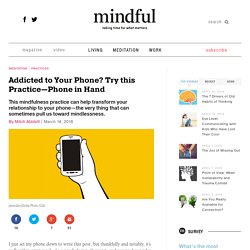
As a psychologist, therapist, and parent, I consider the following to be of great concern: • There is research suggesting that using cell phones for only a half hour a day for ten years doubles one’s risk of brain cancer. • The soreness in our fingers and wrists from texting too much is so prevalent that the term “text claw” has entered our lexicon. • “Problematic Internet Use” (PIU) is now considered a behavioral addiction, with almost half (48 %) of participants in one study considered “Internet addicts.”